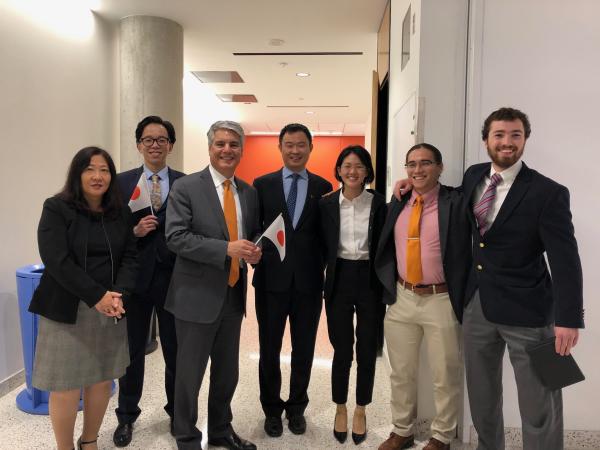Student Team Awarded Presidents Award for Global Learning

An undergraduate research team mentored and led by Community & Regional Planning Associate Professor Junfeng Jiao has been selected for the 2019-2020 President’s Award for Global Learning in the East Asia region for their project “How Autonomous Vehicles Might Aid Vulnerable Populations: A Case Study in Tokyo 2020 Olympic and Paralympic Games.”
Launched in 2018, the President’s Award for Global Learning is the signature program of the International Board of Advisors who, together with President Gregory L. Fenves, are working the expand UT’s global network. The program provides funding for student teams to take on interdisciplinary projects relating to international research, social impact and entrepreneurship in seven regions around the world. Teams must be comprised of students from different majors, with support from up to two faculty mentors and an international partner.
The “East Asia” team includes four undergraduates and one graduate student, among whom two have ties to the School of Architecture and Jiao’s Urban Information Lab (ULI): undergraduate Computer Science major and ULI intern Eliezer Pearl, and Community & Regional Planning PhD student and ULI Graduate Research Assistant Yefu Chen. The full team includes: Jean Kureyama (Psychology), John Sherar (Aerospace Engineering), Peter Sumner (Electrical and Computer Engineering), and Lecturer Junko Hatanaka, who teaches Japanese in the Department of Asian Studies.
The team is one of only five awarded the President’s Award for Global Learning for the 2019-2020 academic year. There were 24 initial proposals submitted from teams composed of 97 students representing 11 colleges, and 55 faculty members representing 12 colleges. A committee of faculty members from across campus reviewed the submitted proposals and selected 11 finalists, who then participated in a pitch competition hosted by a panel of judges selected by President Fenves. The final awardees will receive up to $25,000 toward project implementation costs, as well as additional travel and academic financial support.
The team’s award-winning proposal “How Autonomous Vehicles Might Aid Vulnerable Populations” will take them to Tokyo this summer during the 2020 Tokyo Olympics, where they will study how autonomous vehicles and Robotaxis could potentially be used to improve mobility of Japan’s aging population. In collaboration with Tokyo Metropolitan University and ZMP Inc., a major Japanese robotics company that is launching a full fleet of driverless taxis during the Olympics, the team will carry out detailed online surveys, as well as personal interviews and focus groups with elderly, disabled and able-bodied people in Tokyo about their perceptions of Robotaxis and other modern transportation methods in use during the Olympics. The project will culminate in a proposal for entities such as ZMP, CapMetro and The University of Texas at Austin, where the team will outline their findings and how they might be applied in Austin to improve the public transportation system during special events like Austin City Limits, SXSW and UT football games.
The project builds on and aligns with the research and focus of Jiao’s Urban Information Lab, which uses emerging information technologies to better understand, measure, plan and develop our urban environments. The lab has previous experience studying transportation systems and technologies during special events in Austin, and will help the Global Learning team plan their research and implement their findings in Austin.
For more information about the President’s Award for Global Learning, visit: https://presidentsglobalaward.utexas.edu/

